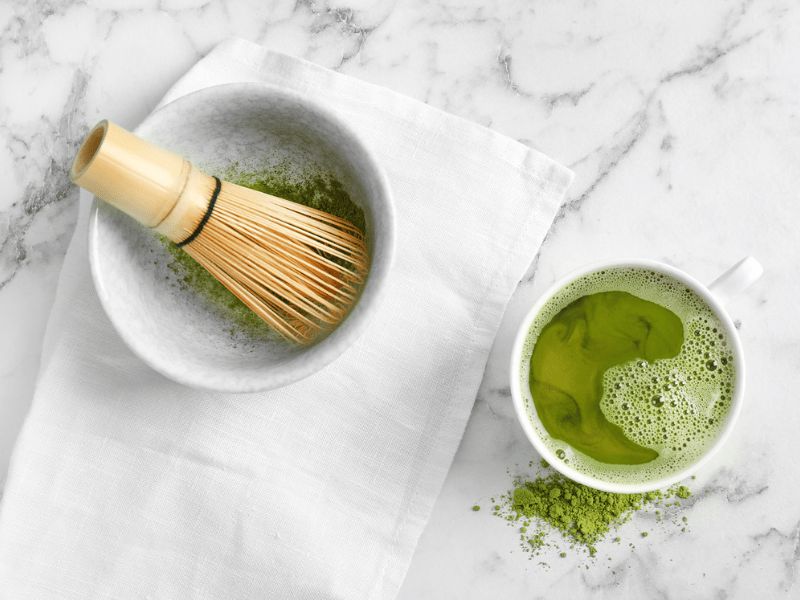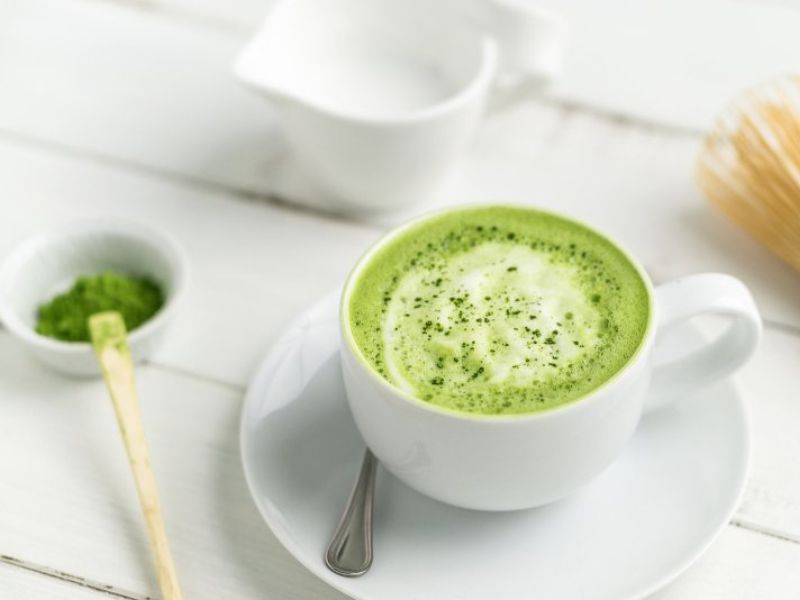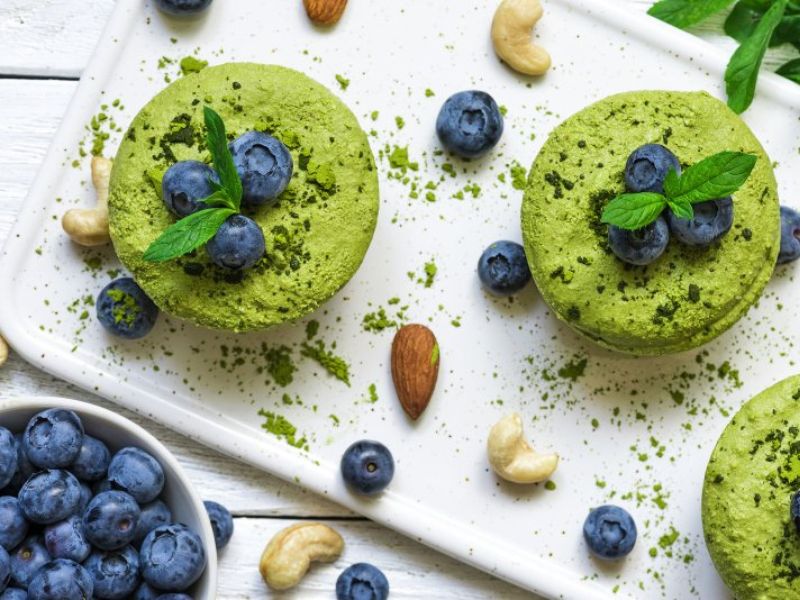Key facts at a glance
-
Matcha tea comes from Japan and offers various health benefits, including antioxidant effects, improved brain performance and cardiovascular health. It can also support weight loss.
-
The quality of matcha depends on cultivation, harvesting and processing; High-quality matcha is certified organic and free of harmful additives.
-
Matcha tea can be used in many ways in the kitchen, for example for drinks such as matcha lattes or in recipes for pancakes, smoothies and ice cream. It gives dishes a special touch and a great green color.
What is Matcha Tea?

Matcha tea is a green tea powder originating from Japan that is traditionally enjoyed on special occasions and religious ceremonies (especially tea ceremonies) and is known for its health benefits and unique taste. The roots of matcha tea go back to ancient China, but only became truly popular in Japan. The drink reached Japan by the monk Eisai in the 12th century, where it is still refined today. Unlike loose green tea or green tea in a tea bag, matcha is consumed in powder form.
The quality of matcha depends heavily on the picking time and processing; High-quality varieties come from the first spring harvests and use special shading techniques. After harvesting, the matcha is steamed and dried, with traditional grinding on granite mills ensuring the quality of the green tea that is processed into powder. This is also one of the biggest differences from other green tea. If this topic interests you, you should definitely read our articles " Matcha tea - harvesting and production " and " Sencha, Tencha, Matcha - you should know these differences ".
The authenticity and purity of matcha tea powder can vary; True matcha is identified based on specific characteristics such as color, aroma and texture, although products of lower quality with an intentionally intense aroma are usually referred to as cooking or baking matcha.
Enjoying high-quality matcha tea, which is obtained from the Camellia sinensis plant, is a real pleasure for all the senses and also has a positive effect on the body and mind!
Ingredients and Health Benefits of Matcha Tea
Matcha tea is not only a delicious drink, but also a real energizer for the body. Matcha tea contains a wealth of nutrients including:
-
Vitamins such as vitamins A B1, B2, B3, E, C, K
-
Minerals such as calcium and potassium
-
Beta-carotene, an important antioxidant for eyes, skin, mucous membranes and metabolism.
But how exactly do these ingredients contribute to our well-being? Let's take a closer look at this in the following sections and learn some facts about it.
Antioxidant effect
The antioxidant effects of matcha tea are a key reason for its health benefits. Compared to conventional green tea products, Matcha tea has a 137 times higher concentration of EGCG, the most effective catechin. This powerful antioxidant capacity of matcha tea is made possible by high amounts of EGCG and beta-carotene, which protect the body from free radicals and can slow down the aging process of the skin.
EGCG in matcha tea provides 100 times protection against free radicals compared to vitamin C and 25 times compared to vitamin E. In addition, matcha tea has one of the highest ORAC values (Oxygen Radical Absorbance Capacity), a measure of the antioxidant capacity of a food, surpassing other known antioxidant carriers such as acai berries and organic orange oil.
The antioxidant effect of matcha tea is therefore not only beneficial for our health, but also helps to keep our skin youthful and radiant. It is not for nothing that matcha tea, with its abundance of antioxidants, is often referred to as the “elixir of youth”!
Brain performance and relaxation
In addition to its antioxidant properties, matcha tea also has positive effects on our brain performance and relaxation. The combination of caffeine and L-theanine in matcha tea increases alertness and attention without the typical sluggish feeling after consuming coffee. L-Theanine enhances relaxing alpha waves in the brain, which has a positive effect on the ability to concentrate and reduces the overstimulating effects of caffeine, such as nervous tremors.
The mood-enhancing properties of matcha tea, conveyed by increasing dopamine levels, can increase feelings of joy and motivation and reduce the risk of depression and anxiety. Matcha contains caffeine that is bound to tannins and is therefore more tolerable than isolated caffeine in other drinks, while L-theanine reduces the stimulating effect of caffeine. The caffeine content in matcha tea contributes to these positive effects.
Thus, matcha tea can help keep our minds alert and relaxed and can be a healthy alternative to coffee or other caffeinated drinks. Not least because high coffee consumption can increase the risk of diseases such as stroke. We have put together an interesting comparison of matcha and coffee for you in our blog " Matcha tea - the unusual alternative to your coffee ".
Cardiovascular health
Matcha tea also has positive effects on our cardiovascular system. It contains high amounts of the main catechin epigallocatechin gallate (EGCG), which can reduce the risk of cardiovascular disease and cancer. The results of a study showed that the risk of death from cardiovascular disease was reduced by 20 to 30 percent in people who drank at least 5 cups of green tea and/or matcha tea daily.
Additionally, antioxidants in matcha tea can reduce the risk of heart disease by up to 31 percent. Matcha may also be beneficial for lowering cholesterol levels, particularly LDL cholesterol, triglycerides, and blood sugar levels.
Due to its higher concentration of antioxidants, matcha tea may have a stronger preventive effect against heart disease than traditional green tea. So it's no exaggeration to say that a cup of matcha tea a day can keep the heart strong! In addition, the pick-me-up tea has a positive effect on general well-being.
Matcha tea and weight management
Who would have thought that this delicious green tea could also help you lose weight? Various studies show that matcha tea can help you lose weight by increasing calorie consumption and increasing fat burning. Green tea extract, a component of matcha, is often used in weight loss products because it can boost metabolism and significantly increase fat burning.
Drinking matcha tea, especially immediately after getting up on an empty stomach, can act as an appetite suppressant and stimulate your metabolism. However, it is important to emphasize that matcha tea alone is not a miracle weight loss cure. It should be considered part of a balanced diet and healthy lifestyle.
Still, adding matcha tea to your daily routine can be an easy and delicious way to support your weight management goals. Try it out and discover the positive aspects for yourself!
Traditional and modern matcha tea preparation

Now that we know the health benefits of matcha tea, you may be wondering how to make this delicious tea. For the traditional preparation of matcha tea in the matcha bowl (chawan), the following steps are followed:
-
About 1-2 grams of Matcha powder, equivalent to a level teaspoon or 1-2 heaped Matcha bamboo spoons (Chashaku), are added to the bowl.
-
Approximately 50 ml of water at around 80 degrees is poured over the matcha powder.
-
The matcha powder is whipped with a bamboo whisk (Chase) for approx. 15-20 seconds in quick zigzag movements until foamy.
This is how you get a perfectly prepared matcha tea. It's best to enjoy it straight from the matcha bowl and let yourself be pampered by its unique taste and health benefits.
After whipping, additional hot water can be added, depending on taste and intensity. Traditionally in Japan, matcha tea is served with a small sweet to complement the taste experience.
Modern preparation methods include matcha latte, in which a creamy drink is created from green tea powder and foamed milk or a vegan milk alternative such as almond, soy or oat milk. Matcha smoothies are prepared by mixing matcha powder with fruits and liquids such as juice or milk. Modern utensils such as milk frother, shaker or mixer can be used for quick and easy preparation.
You can find everything you need to know about the different preparation methods of matcha tea in our blog " Matcha tea preparation - tips & tricks for traditional matcha preparation ".
Quality and safety for matcha products
The quality and safety of matcha products is an important aspect that you should consider. Organic certified matcha guarantees that the product has been produced in compliance with organic guidelines, increasing quality and safety. High-quality matcha tea is of organic quality, which guarantees no harmful additives and does not use genetically modified raw materials.
When buying matcha tea, you should pay attention to organic certification in order to receive a pure and natural product that is free of harmful substances. It is advisable to limit your daily intake of organic matcha tea to a maximum of two cups in order to avoid possible undesirable effects such as nausea due to too many plant ingredients or pollutants.
A balanced amount of organically certified matcha tea not only offers a high-quality drink, but also minimizes the risk of health problems caused by harmful substances. So it's worth spending a little more for quality to get the best health benefits of organic matcha tea!
Matcha tea in the kitchen: creative recipe ideas

In addition to drinking matcha tea, you can also try out creative recipes using matcha tea as an ingredient. By adding matcha in recipes such as:
-
Matcha pancakes
-
Matcha cheesecake
-
Matcha cookies
-
Matcha ice cream
Desserts can not only have a special taste, but also shine in an attractive green. This is not the only reason why Matcha is extremely popular.
For example, a detailed recipe for homemade matcha ice cream includes:
-
Whipping egg yolks and sugar
-
Mixing matcha with sugar, milk and cream
-
Heating the mixture
-
A cooling down period
You can read exactly how best to prepare it in our blog “ Matcha Ice Cream | Matcha Recipe ”.
The versatility of matcha powder can be explored in modern cuisine, from classic drinks to innovative sweet and savory dishes, to make the diet colorful and healthy.
Let your creativity run wild and experiment with green tea in your cooking and baking!
Summary
In summary, matcha tea is not only a delicious drink but also offers numerous health benefits. From improving brain performance and relaxation, to supporting the circulatory system and weight management, to its antioxidant effects - matcha tea is a true powerhouse. Whether you enjoy it traditionally as a tea or incorporate it into your favorite recipes, matcha tea is a wonderful addition to a healthy lifestyle! You will be amazed by the matcha tea effect!
frequently asked Questions
What is matcha tea good for?
Matcha tea is good for concentration, brain performance and has an uplifting and relaxing effect. It is particularly suitable as a companion throughout the working day and ensures that brain function is maintained well into old age.
Is matcha tea really that healthy?
Yes, matcha tea is actually very healthy as it is rich in antioxidants and contains various healthy ingredients such as B vitamins, iron, potassium and magnesium. However, it is important to pay attention to the quality and correct preparation.
When is it best to drink matcha tea?
It is best to drink green tea in the morning before your first meal to benefit from the detoxifying and invigorating effect.
How much matcha can you drink per day?
It is recommended not to drink more than 2 to 3 cups of matcha tea per day as this does not exceed the maximum recommended level of caffeine. Look for high-quality matcha powder and enjoy it in moderation.
What is matcha and what does it do?
Matcha is a special powdered green tea that provides energy due to its high caffeine content and is good for fitness activities. It also has valuable antioxidants and is consumed by many athletes as a cold drink during and after training.



